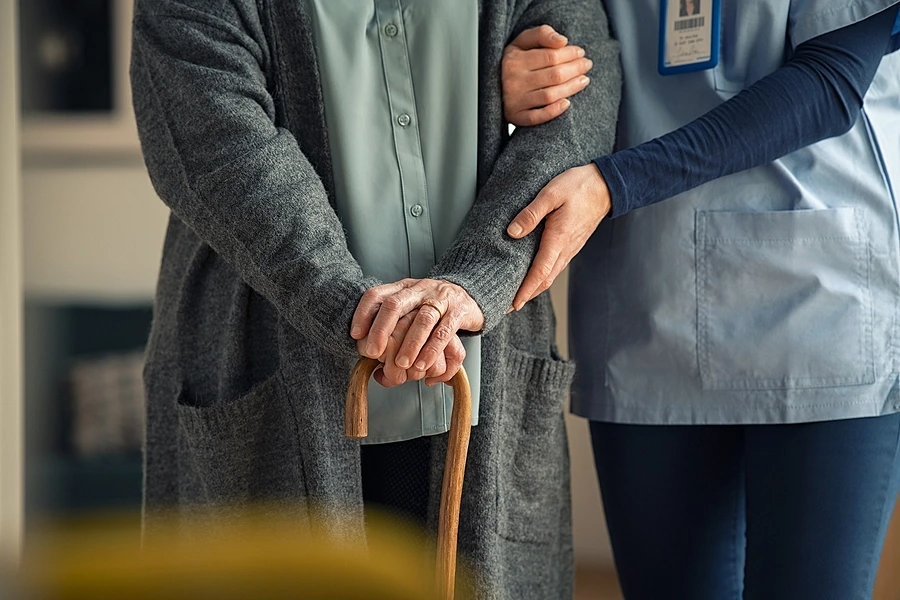Florida Nursing Home Abuse & Negligence Attorneys

In the serene sunsets of Florida, when families entrust their loved ones to nursing homes, they expect safety, care, and dignity. The unsettling reality of nursing home abuse, however, can shatter that trust, leaving families grappling with anguish and seeking justice. At Weston & Pape, we stand at the forefront of this battle, armed with expertise and compassion, ensuring that the rights of our state’s most vulnerable are staunchly defended. If you need a nursing home abuse lawyer, let’s join hands in this pursuit of justice; reach out at 407-537-6991 for a no-obligation consultation today.
Understanding Nursing Home Abuse Claims in Florida
As our loved ones age, their safety and well-being become paramount—especially when they are entrusted to the care of a nursing home or assisted living facility. In Florida, where a large percentage of the population is over the age of 65, ensuring that elderly residents receive quality care is a critical concern. Families often place immense trust in nursing homes, expecting them to provide not just basic care, but also dignity, compassion, and respect. Unfortunately, not all facilities live up to these expectations. Abuse and neglect do occur—and when they do, legal recourse may be necessary.
Understanding nursing home abuse claims in Florida is vital for anyone with an elderly family member in a care facility. These claims are not just about seeking justice—they’re about protecting vulnerable individuals, preventing further harm, and holding negligent institutions accountable.
What Is a Nursing Home Abuse Claim?
A nursing home abuse claim arises when a resident suffers harm due to the negligent, reckless, or intentional actions of nursing home staff or administrators. Abuse can be physical, emotional, sexual, or financial in nature. It can also include neglect, where the facility fails to provide essential care or maintain a safe environment. When such actions result in injury or loss to a resident, families may file a civil claim against the responsible party to recover damages and initiate changes in the facility’s practices.
These claims serve two important purposes: they provide compensation for the victim and their family, and they act as a deterrent, encouraging higher standards of care and accountability within the elder care industry.
Common Types of Nursing Home Abuse in Florida
Understanding the various forms of abuse is the first step in identifying it. Abuse can be overt or subtle, and signs are not always immediately obvious.
1. Physical Abuse:
Physical abuse includes hitting, slapping, pushing, kicking, or inappropriate use of restraints. It can also involve force-feeding or overmedicating residents. Signs may include unexplained bruises, fractures, cuts, or a sudden fear of staff members.
2. Emotional or Psychological Abuse:
This includes verbal assaults, threats, humiliation, intimidation, or isolating a resident from social interactions. Victims may become withdrawn, depressed, anxious, or exhibit mood changes. While there may be no physical evidence, the emotional toll can be significant.
3. Sexual Abuse:
Sexual abuse in nursing homes is any non-consensual sexual contact or activity involving a resident. This may be especially difficult to detect, particularly if the victim is non-verbal or cognitively impaired. Signs can include bruising in sensitive areas, panic attacks, or sudden behavioral changes.
4. Neglect:
Neglect is often unintentional but can be just as harmful. It involves the failure to provide adequate food, water, hygiene, medical treatment, or supervision. Common consequences include bedsores, malnutrition, dehydration, poor personal hygiene, and frequent infections.
5. Financial Exploitation:
This includes the unauthorized use or theft of a resident’s money, credit cards, or personal property. Staff members may coerce residents into signing financial documents or misuse access to banking information. Warning signs include sudden changes in financial status, missing belongings, or unusual withdrawals from bank accounts.
Florida Laws Protecting Nursing Home Residents
The state of Florida takes nursing home abuse seriously and has enacted comprehensive laws to protect the rights of elderly residents. Under Florida Statute § 400.022, also known as the Resident’s Bill of Rights, individuals residing in long-term care facilities are entitled to:
-
Be treated with dignity, respect, and fairness
-
Retain civil and religious liberties
-
Communicate privately and have unrestricted access to visitors
-
Manage their own finances unless they voluntarily delegate that responsibility
-
Receive adequate and appropriate health care and protective services
-
Present grievances without fear of reprisal
When any of these rights are violated, the victim—or their legal representative—has the right to pursue a claim. Facilities found in violation may face civil penalties, license revocation, and legal liability for damages.
How to Identify Abuse or Neglect
One of the most difficult aspects of elder abuse is that it often goes unreported. Residents may be afraid to speak up, suffer from cognitive impairments like dementia, or simply be unaware that what they’re experiencing is abusive.
Families should be vigilant and watch for warning signs such as:
-
Unexplained injuries or frequent trips to the emergency room
-
Sudden changes in behavior, including fearfulness or depression
-
Poor hygiene, dirty clothes, or soiled bedding
-
Weight loss or signs of malnutrition
-
Confusion about financial transactions or missing funds
-
Staff reluctance to leave the resident alone with family
What to Do If You Suspect Abuse
If you suspect that a loved one is being abused or neglected in a Florida nursing home, immediate action is essential:
Document Everything:
Begin compiling evidence. Take photographs of injuries, keep a journal of incidents or behavioral changes, and record any troubling interactions with staff. If possible, obtain medical records or witness accounts from other residents or visitors.
Report the Abuse:
Abuse or neglect should be reported to the Florida Department of Children and Families’ Adult Protective Services division. You can also report it to the Florida Department of Elder Affairs or the Agency for Health Care Administration (AHCA), which oversees nursing home licensing and inspections.
The statewide Abuse Hotline (1-800-96-ABUSE) is available 24/7 to file complaints.
Consult with a Nursing Home Abuse Attorney:
Navigating these cases can be complex, especially when dealing with powerful corporate nursing home chains and their insurers. A skilled Florida personal injury attorney with experience in elder abuse claims will know how to gather the necessary evidence, identify liable parties, and file your claim within the statute of limitations.
Legal Process for Filing a Nursing Home Abuse Claim
The legal process typically follows these general steps:
-
Case Evaluation: The attorney will review the facts of your case, assess the evidence, and determine whether there are grounds for a lawsuit.
-
Investigation: Attorneys often work with medical experts, forensic specialists, and elder care professionals to build a strong case.
-
Filing the Lawsuit: If a settlement cannot be reached, a formal lawsuit will be filed in civil court. In Florida, the statute of limitations for most nursing home abuse claims is two years from the date the abuse was discovered (or reasonably should have been discovered).
-
Discovery and Negotiation: During this phase, both parties share information and may attempt mediation. Many cases are resolved through a negotiated settlement.
-
Trial: If no agreement is reached, the case will go to trial, where a judge or jury will determine liability and damages.
Compensation in Nursing Home Abuse Cases
Victims and their families may be entitled to compensation for:
-
Medical expenses (both current and future)
-
Pain and suffering
-
Mental and emotional anguish
-
Costs of relocating to a safer facility
-
Rehabilitative therapy
-
Loss of enjoyment of life
-
Punitive damages, in cases involving egregious conduct
In cases where abuse leads to death, families may pursue a wrongful death claim, which includes funeral expenses and loss of companionship.
Preventing Nursing Home Abuse
While legal action can help after abuse occurs, prevention remains the ideal. Families can reduce the risk by:
-
Visiting frequently and at varying times of day
-
Building relationships with staff and observing their interactions with residents
-
Monitoring your loved one’s physical and emotional health closely
-
Reviewing the facility’s inspection reports and ratings through AHCA’s online resources
Conclusion: Advocating for the Vulnerable
Nursing home abuse is a devastating breach of trust, and no family should have to endure the trauma of watching a loved one suffer in a place that was supposed to protect and care for them. Florida provides families with powerful legal tools to seek justice and compensation, but timely action and expert legal guidance are key.
If you believe a loved one has been mistreated in a nursing home, don’t hesitate to take action. Speak up, seek help, and consult with a knowledgeable attorney who understands the laws, procedures, and emotional sensitivities involved in nursing home abuse claims.
In doing so, you not only stand up for your own family member—you also help set a standard that protects others from similar harm in the future.
The Timeline of Your Claim: What to Expect
Nursing homes should be sanctuaries of care, offering residents solace, safety, and dignity in their golden years. Unfortunately, for many families in Florida, this idyllic image shatters upon discovering incidents of nursing home abuse. As heart-wrenching as the revelation may be, it’s vital for families to understand the timeline of seeking justice for their loved ones.
Recognizing and Reporting the Abuse
- Immediate Actions: Upon recognizing signs of abuse (physical injuries, emotional distress, unexpected medical issues), it’s paramount to ensure the safety of the resident, either by addressing concerns with the facility or considering a transfer.
- Reporting: Florida mandates the reporting of suspected elder abuse. Once suspicions are confirmed, notify the Florida Department of Children and Families.
Gathering Preliminary Evidence
Document everything. This includes taking photographs of injuries, jotting down accounts of events, and maintaining records of any communication with the nursing home.
Legal Consultation
Seek the counsel of an experienced personal injury lawyer specializing in nursing home abuse. Their guidance will be crucial in evaluating the merits of your case and guiding subsequent actions.
Formal Investigation
Once engaged, your attorney will initiate a more thorough investigation. This could involve collaborating with medical professionals to assess the extent of injuries, interviewing staff and other residents, and obtaining facility records.
Filing the Lawsuit
Based on evidence and consultations, your attorney will draft and file a lawsuit against the nursing home. In Florida, the statute of limitations for nursing home abuse claims is typically two years from the discovery of the abuse, but this can vary based on specific circumstances.
Discovery Phase
Both the plaintiff (you) and the defendant (nursing home) will exchange evidence, witness testimonies, and expert evaluations. This discovery phase aids both sides in understanding the strengths and potential vulnerabilities of their case.
Negotiation and Settlement
Many nursing home abuse claims in Florida settle outside of court. Your attorney will negotiate with the nursing home’s legal team, seeking a resolution that compensates adequately for the trauma and injuries sustained.
Going to Trial
If a settlement isn’t reached, the case proceeds to trial. Here, all evidence is presented, and a verdict is sought. Depending on the complexities of the case, a trial can last from a few days to several weeks.
Post-Trial Outcomes
Depending on the trial’s outcome, either party may opt to appeal the decision, potentially prolonging the case. If the verdict is in the victim’s favor, the awarded compensation will be secured following the trial.
The journey to seek justice for nursing home abuse in Florida is undoubtedly complex, a winding path marked by legal intricacies and emotional challenges. However, with a clear understanding of the timeline and the right legal partner, families can navigate this terrain with confidence, ensuring their loved ones receive the justice they so rightly deserve.
Speak to a Florida Nursing Home Abuse Attorney
The journey to justice in nursing home abuse cases can be daunting, laden with intricate legal paths and emotional crossroads. However, you’re not alone. With Weston & Pape by your side, you have an ally committed to ensuring that every step you take is towards safeguarding the rights and dignity of your loved ones. We believe in not just offering legal expertise but also providing a shoulder of support and understanding. As you contemplate the road ahead, remember we’re here to guide, assist, and fight for you. Contact us today at 407-537-6991 for a free consultation, and together, let’s champion the cause of justice.


 Call Us Today - It's Free
Call Us Today - It's Free